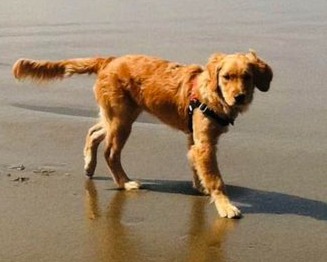Smells Like Teen Spirit
- Beth Deitchman

- Nov 10, 2023
- 2 min read
In dogs adolescence begins when they are around six months old and can last until they are two (or longer depending on the breed). Just as it does in human teenagers, your adolescent dog’s brain matures in stages, starting at the back and ending in the front. As a result, they lack the impulse control and decision making skills that the fully formed frontal lobe provides. Quick to overstimulate but slow to settle, teen dogs often seek adventure and excitement no matter the consequences. And all that careful puppy training may seem to disappear in a moment.
But you can help your teenage dog, first by setting him up for success with solid management strategies. Know what tends to overstimulate your dog and remove him from the situation before he has a chance to go over threshold. That might mean taking walks at quieter times of day or arranging playdates with your dog's friends rather than going to the dog park. You could also avoid busy hiking trails or popular beaches. If children trigger overstimulation, steer your dog away from them and consider leaving your teenage dog at home when you are going anywhere distracting or busy like a family holiday party or a crowded café. While they won't sleep as much as they did as puppies, give your teenage dog plenty of opportunities to rest.
Enrichment will also help you and your dog navigate adolescence. Let him sniff on walks or forage for his kibble in a snuffle mat, for example, as those behaviors can lower overall stimulation levels. Positive reinforcement training is a great way to work his mind while building your bond. To satisfy your dog's desire for adventure and autonomy, take him to a Sniffspot where he can explore a new place safely. Invest in a good long line for sniffy walks or hikes to give him more freedom to move without risking escape. Exercise is an important enrichment for your teenage dog, but it can also lead to overstimulation, so avoid rousing games of tug or wrestling with your dog. For dogs who enjoy other dogs, play can be great exercise, though it can also lead to overstimulation. With any form of enrichment, be sure that it leaves your dog calmer and more relaxed.
Above all, practice patience with your teenage dog. He is not trying to drive you crazy--he is simply passing through a normal developmental stage. However, if any new or troubling behaviors appear, like separation anxiety or resource guarding, or you just want some guidance from a professional, contact a certified trainer or behavior consultant who uses positive reinforcement and force-free training techniques.
Thank you to everyone who shared photos of their teenage pups!






























Comments